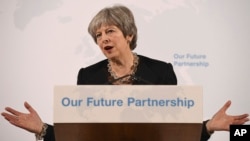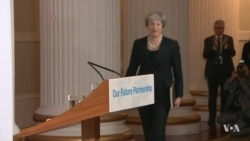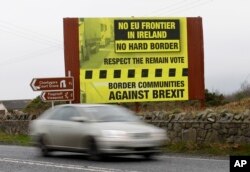British Prime Minister Theresa May has said she is confident that a deal on leaving the European Union can be reached, but warned, "No one will get everything they want" out of Britain's pending departure, known as Brexit. Britain is due to leave the bloc in March of next year, but wants a two-year transition period to help businesses adapt.
Under pressure from members of her Conservative party, the political opposition and the EU to deliver details on Britain's negotiating position, May's comments Friday were billed as a major step on the road to Brexit.
WATCH: Britain's May Urges Brexit Talks to Speed Up, as Fears Grow of 'Cliff-Edge' EU Exit
"We all need to face up to some hard facts. We're leaving the single market. Life is going to be different; in certain ways our access to each other's markets will be less than it is now," she told an audience at London's Mansion House, the mayor's official residence.
Europe has said it will not allow Britain to "cherry pick" the best bits of EU membership. May countered that she wanted the deepest possible relationship.
"The fact is that every free trade agreement has varying market access depending on the respective interests of the countries involved. If this is cherry picking, then every trade arrangement is cherry picking."
May said Britain would remain closely bound to Europe in many areas, including associate membership in chemical and aviation agencies, plus scientific, cultural and educational programs. Business groups welcomed that clarity, but many analysts say there is still too little detail.
"She just says things like, 'We want to maintain the prosperity of the country, we want to respect the referendum result.' I don't think there's anything new in the way the objectives are laid out," Peter Holmes, of the UK Trade Observatory at the University of Sussex, told VOA in an interview.
'Closing the door on itself'
One of the most contentious issues is the border between the Irish Republic and Northern Ireland, the latter being part of Britain. There are fears any physical frontier could rekindle sectarian violence, which largely ended with the peace deal known as the 1998 Good Friday Agreement. The EU has proposed keeping the north within its Customs Union – but that was strongly rejected by London.
"In all these areas, bold and creative thinking can deliver new agreements that are on the very best interests of all our people both in the UK and across the EU," May said.
Europe appears less willing to compromise. The EU's chief Brexit negotiator, Michel Barnier, warned that Britain's so-called red lines prevent any special deal.
"The UK is closing the door on itself, one by one. And the only possible model that remains is that of the free trade agreement, as we did recently with Canada, we are doing with Japan or Korea," Barnier told journalists Thursday in Brussels.
Britain faces negotiating new terms not only with Europe, but also with around 60 other countries that have free trade agreements with the EU, says analyst Holmes of the UK Trade Observatory.
"About half our trade is with the EU. And about another 10 to 15 percent is with the countries that we have free trade agreements with. We're going to lose those free trade agreements because they automatically lapse as we leave the EU. But the government seems to feel that we'll be able to get new and better ones. Now, I think this is very questionable why we, acting independently, should be able to get more advantageous trade deals than we can as a part of the EU," Holmes said.
The prime minister finished her speech with a message to Europe: "Let's get on with it." Britain has a year to strike a deal, or at the very least, an agreement to extend the talks, until its official departure March 29, 2019.












